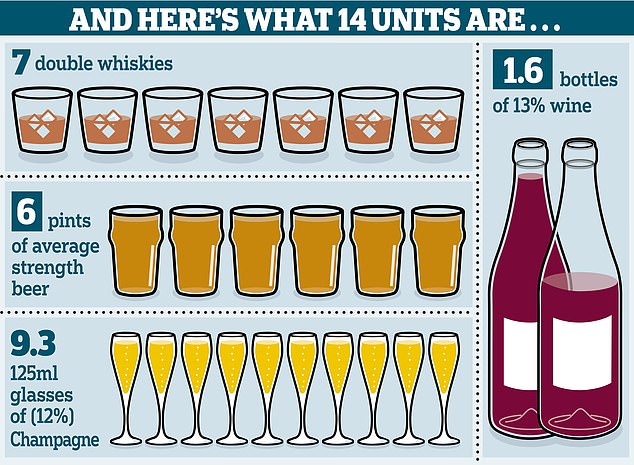Surprising reason why Dry January is the WORST thing you can do for your health, according to experts
Experts have warned against the popular Dry January trend due to the risks of debilitating symptoms such as hallucinations, vomiting and insomnia.
While giving up the drink for a month may have minor health benefits for moderate drinkers, for those who regularly consume a lot of alcohol, going cold turkey can actually be life-threatening.
Alcohol acts on brain chemicals to depress the nervous system – the complex collection of nerves that send messages between the brain and the body.
When heavy drinkers suddenly stop, the chemicals in the brain are sent into shock, disrupting these signals and affecting the function of multiple body processes.
Most alarming is the risk of fatal cardiac arrest, which can occur due to malfunctioning of brain cells, causing the heart to beat irregularly.
For those of us who drink moderately, Dry January may not be the healthiest initiative either, as experts say it leads to excessive drinking in February, ‘negating’ any benefits.
‘Events like Dry January don’t work for everyone as many people don’t realize they are dependent on drink,’ Lester Morse, addiction specialist at Rehabs UK, told MailOnline.
‘What many people don’t know about quitting alcohol is that there are serious dangers if you are dependent on alcohol. In some cases, withdrawal can even result in death.
An estimated 200,000 people took part in Dry January in 2024, according to Alcohol Change UK
“It doesn’t necessarily take a huge amount of alcohol to cause dependence in some people.”
According to Alcohol Change UK, an estimated 200,000 people took part in Dry January in 2024.
Meanwhile, more than a quarter of British adults regularly binge drink, and government estimates suggest there are more than 600,000 people dependent on alcohol in England alone.
Heavy and frequent alcohol consumption has been linked to a wide range of health problems, from diabetes to dementia and several types of cancer.
‘If alcohol costs you more than money – perhaps relationships, jobs, friendships – you need to take a good, hard and honest look at your consumption.’
Ian Hamilton, associate professor of addiction at the University of York, also warned against a ‘DIY detox’.
‘There is a significant proportion of people who risk serious damage to their physical and mental health if they abruptly stop consuming alcohol,’ he told MailOnline.
‘It mainly concerns people who are dependent on alcohol and do not need to do a do-it-yourself detox, but need specialist support. “Some could possibly die if they suddenly stop drinking,” he added.

The NHS recommends that adults drink no more than 14 units per week – that’s 14 individual shots of spirits or six pints of beer or one and a half bottles of wine.
Mr Hamilton also worries that people will binge drink again at the end of the month and make little to no progress.
He said: “We don’t know what people are doing when they get to the end of January. I fear that many will think that if they have abstained for a month, they have a free pass for the rest of the year and can drink as they please. as much as they want.
‘The Chief Medical Officer’s advice is to have two alcohol-free days every week of the year. So after a month of abstinence, some may think they’ve had enough alcohol-free days to return to binge drinking.”
But he also worries about those who can’t manage to stay dry all month.
“This could lead them to think they have failed and that they cannot change their relationship with alcohol, so they simply give up because their self-confidence has taken a hit,” he said.
Doctors are urging people to seek medical advice if the dryness makes them shake, feel very nervous and lose their appetite.
Alcohol withdrawal can also cause symptoms such as nausea and vomiting, tremors, insomnia, anxiety, palpitations and hallucinations, according to clinical pharmacist and CEO of the Association of Independent Multiple Pharmacies Dr. Leyla Hannbeck.
Sudden withdrawal can also lead to severe jerks, seizures and delirium in some cases, she explained.
‘The level of symptoms experienced depends on how much alcohol was consumed in what period and how often,’ says Dr Hannbeck.
‘Similar treatment will also depend on the level of alcohol consumption and may sometimes involve prescription of medication or detoxification under the supervision of a supervisor, nurse or doctor or guidance.’
If someone drinks more than 14 units a week — about a bottle and a half of wine — and craves alcohol first thing in the morning, they may be dependent, says Dr. Hannbeck.
Other signs include difficulty quitting after just two drinks, feeling out of control when you drink or that drinking is interfering with your daily life and health, said Joe Marley of Alcohol Change UK.
However, Dry January is an effective and sustainable way to cut back.
Research from the University of Sussex, published in 2020, found that 70 percent of Dry January participants were still drinking less booze six months later – but interestingly this only applied to those who did the campaign with support from Alcohol Change UK.
Dr. Hannbeck agreed that going sober for a month can be a positive step toward improving physical health.
She urged those who rely on alcohol to start their sober journey by speaking to a GP or a charity that supports people with alcohol abuse.
